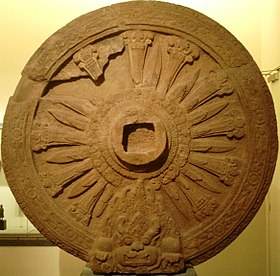Dharma (Buddhism)
![]()
The title of this article is ambiguous. For other meanings, see Dharma (disambiguation).
Dharma (Sanskrit धर्म dharma; Pali धम्म dhamma; Thai ธรรม, RTGS Tham; Chinese 法, Pinyin fǎ) is a central concept of many Asian religions (including Hinduism, Buddhism, Jainism and Sikhism), which has different meanings depending on the religion. Dharma can include law, justice and custom, as well as ethical and religious obligations and values, but it can also refer to religion, ethics or morality in general, or to specific religious rituals, methods and actions.

Wheel of the Dharma (Guimet Museum, Paris)
.jpg)
Buddha in teaching gesture (dharmachakramudra), Sarnath Museum; below the throne seat his disciples worship the 'wheel of teaching'.
Dharma in Jainism
Jainism is also called Jain Dharma ('Jain doctrine'). The reflections and speculations on the right ways of thinking and living of the other two great religions of India have found their way into it in various ways; on the other hand, the teachings of Jainism have influenced the teachings of the other religions. However, in the course of its development the three 'small vows' (anuvratas) for lay followers have proved to be the central teachings of Jainism: non-violence towards all immanent forms of existence (ahimsa), independence from unnecessary possessions (aparigraha) and truthfulness (satya) as well as the two complementary attitudes towards life resp. In addition, the five 'Great Vows' (mahavratas) for monks and nuns, which were extended by two additional precepts (respect for other people's property (asteya) and chastity (brahma)), were developed.
See also
- Dharmachakra
- Sutra
- Tripitaka
Search within the encyclopedia